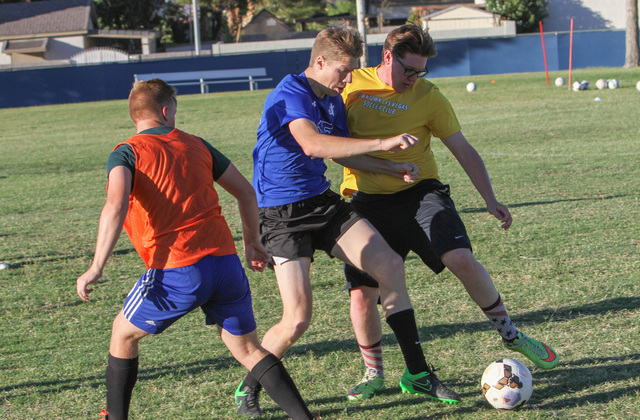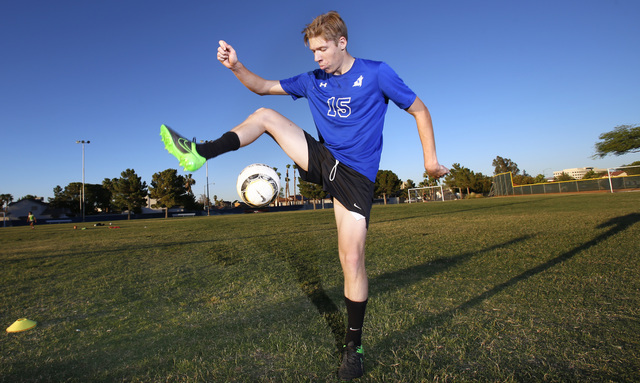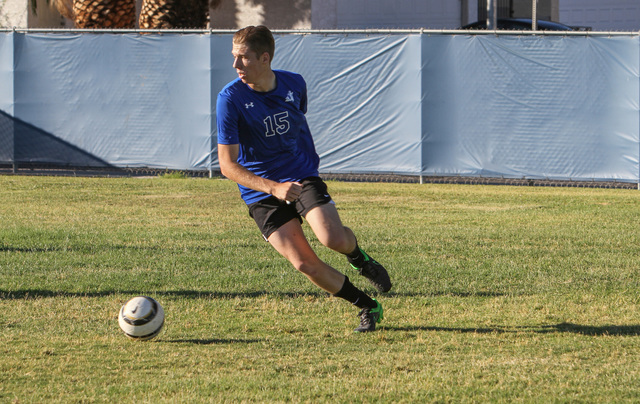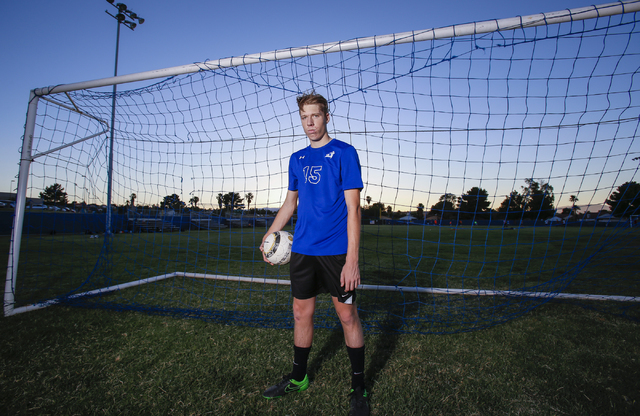College of Southern Nevada adds soccer teams to its ambitious athletic plans
Connor Malone has wanted to be a professional soccer player for as long as he can remember, so when he learned the College of Southern Nevada was starting a men’s soccer program, he eagerly signed up.
Community colleges have long served as a pipeline of dreams for aspiring athletes like Malone, offering them a place to further their education while honing athletic skills that might attract attention from major college programs. Or, in the case of CSN baseball alum Bryce Harper, shoot straight to the big leagues.
“This is a really good first step,” said Malone, 18, who graduated this month from Green Valley High School and has played competitive soccer since age 7. “Recruiters look at junior college players more than just high school players.”
CSN expects to benefit, too. Despite financial troubles in recent years, the college has decided to grow its athletics program, expanding from two sports to five in the past year. Men’s and women’s soccer will begin play this fall, joining women’s volleyball as the newest teams to don the Coyotes’ blue and gold.
School leaders also have discussed reinstituting men’s and women’s basketball, possibly by 2018. CSN briefly had both sports in the early 2000s when the school was known as Community College of Southern Nevada, but the programs were disbanded in 2003 after running a combined deficit of $300,000.
School president Michael Richards says the cost of adding new sports programs will pay off by attracting more students to CSN, which has struggled for years to draw enough applicants. He also believes the ambitious expansion will boost CSN’s community presence.
“In a sense, what we have is a recreational program on steroids,” Richards said. “It does not strain the resources of the college or the community, but provides a direct opportunity for students to have the sports experience.”
COLLEGE ‘GATEWAY’
CSN previously had a women’s soccer team, but the sport was dropped in 2002 and replaced by softball in 2004. The school has offered baseball since 2000 and won the National Junior College World Series in 2003.
“We want to provide an opportunity to young people who want to have that sports experience and use that vehicle to get to higher education,” said athletic director Dexter Irvin, who led the expansion effort.
While schools have myriad reasons for creating new sports teams, experts say many do it to simply boost their brand.
“Those of us in collegiate athletics will tell you athletic programs serve as a front porch to a university or college,” said Mark Krug, a spokesman for the National Junior College Athletic Association. “Athletics is that gateway that gets people interested in a college and gets them to learn more about it.”
EXPANSION COSTS
School leaders have eagerly backed Irvin’s vision, even as they grapple with sweeping budget cuts blamed, in part, on slumping enrollment. Each new program will cost the school $35,000 during its first season, with ongoing yearly expenses of $75,000. The teams will be overseen by part-time coaches making $15,000 per year.
To help keep a lid on costs, volleyball players will compete inside the gym at CSN’s North Las Vegas campus and soccer teams will play at public parks until the school can build fields at the Henderson campus. CSN will not offer athletic scholarships to the new teams.
“It’s interesting to note that all those students are paying their own tuition, and there’s a significant revenue generator there,” Irvin said. “It’s a very good economic model.”
HIGH DEMAND
Administrators say the new programs have lured lots of community interest; soccer tryouts drew about 130 men and 45 women in April, with most participants registering as first-time CSN students. Each team consists of about 30 players, and they’ve all signed up for at least 12 credit hours to qualify to play.
Nationwide, soccer and baseball programs have become increasingly popular in recent years at community colleges, Krug said. Demand for basketball programs, meanwhile, has generally remained steady.
School leaders said they want to draw locals to the new teams. About 80 percent of CSN soccer players are from Clark County.
That’s a big plus for Malone, a native Las Vegan who wants to stay in his hometown and play with other Nevadans.
“The soccer community is very small, and everybody knows each other,” Malone said. “It’s going to be very fun because we all have the same goal in mind. Winning.”
Contact Ana Ley at aley@reviewjournal.com or 702-224-5512. Find her on Twitter: @la__ley




















